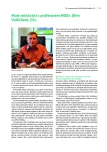-
Medical journals
- Career
New aspects of impact of papillomavirus status in the therapy of head/neck cancer
Authors: Zdeněk Mechl; Dagmar Brančiková
Authors‘ workplace: Interní hematologická a onkologická klinika LF MU a FN Brno, pracoviště Bohunice, přednosta prof. MUDr. Jiří Mayer, CSc.
Published in: Vnitř Lék 2014; 60(Suppl 2): 54-57
Category: 70th Birthday - prof. MUDr. Jiří Vorlíček, CSc.
Overview
The human papillomavirus (HPV) has been identified as the causative agent of a growing subset of head and neck squamous cell carcinomas. The HPV status of the tumors provides prognostic information and may direct treatment strategies. The new and somewhat surprising results presented this years will have an important impact on the treatment of HPV positive head and neck cancers.
Key words:
cetuximab – head and neck cancer – human papillomavirus – oropharyngeal cancer
Sources
1. Spreafico A, Amir A, Siu LL. Demystifying the role of tumor HPV status in recurrent and/or metastatic squamous cell carcinoma of the head and neck. Ann Oncol 2014; 25(4): 760–762.
2. Denaro N, Russi EG, Adamo V et al. State-of-the-Art and Emerging Treatment Options in the Management of Head and Neck Cancer: News from 2013. Oncology 2014; 86(4): 212–229.
3. Psyrri A, Boutati E, Karageorgopoulou S. Human papillomavirus in head and neck cancers: biology, prognosis, hope of treatment and vaccines. AntiCancer Drugs 2011; 22(7): 586–590.
4. Klozar J, Zábrodský M, Kodet R et al. Humánní papilomy v etiologii karcinomu ústní dutiny a orofaryngu. Otolaryng a Foniatr (Prague) 2007; 56 (2): 73–81.
5. Tribius S, Ihloff AS, Rieckmann T et al. Impact of HPV status on treatment of squamous cell cancer of the oropharynx: What we know and what we need to know. Cancer Lett 2011; 304(2): 71–79.
6. Vermorken JB, Psyrri A, Mesia A et al. Impact of tumor HPV status on outcome in patients with recurrent and/or metastatic squamous cell carcinoma of the head and neck receiving chemotherapy with or without cetuximab: retrospective analysis of the phase III EXTREME trial. Ann Oncol 2014; 25(4): 801–807.
7. Lassen P. No prognostic effect of HPV on the result of primary radiotherapy in advanced non-oropharyngeal cancer. ESTRO 33. Wien 2014. Award lecture. Abstract E33–1438.
8. Pogorzelski N, Ting S, Gauler TC et al. Impact of human papillomavirus infection on the response of head and neck cancers to anti-epidermal growth factor receptor antibody therapy. Cell Death and Disease 2014; 5: e1091. Dostupné z DOI: <http://doi: 10.1038/cddis.2014.62>.
9. Rosenthal DJ, Bonner JA et al. Impact of p16 status on the results of the phase III cetuximab/radiotherapy. ASCO 2014. Abstract 6001. Dostupné z WWW: <http://www.csco.org.cn/temp/2014BOAzy.pdf>.
10. Fakhry C, Zhang Q, Nguyen-Tan PF et al. Human papillomavirus and overall survival after progression of oropharyngeal squamous cell carcinoma. J Clin Oncol 2014; 32(30): 3365–3373.
11. Hafkamp HC, Mooren JJ, Claessen S et al. P21 Cp1/WAF 1 expression is strongly associated with HPV - positive tonsillar carcinoma and a favourable prognosis. Mod Pathol 2009; 22(5): 686–698.
12. Syrjänen K, Syrjänen S, Lamsberg M. Morphological and immunohistochemical evidence suggesting HPV involvement in oral squamous cell carcinogenesis. nt J Oral Surg 1983; 12(6): 418–424.
13. Gillison ML, Koch WM, Capone RB et al. Evidence for a causal association between human papillomavirus and a subset of head and neck cancers. J Natl Cancer Inst 2000; 92(9): 709–720.
14. Ang KJK, Harris J, Wheeler R et al. Human papillomavirus and survival of patients with oropharyngeal cancer. N Engl J Med 2010; 363(1): 24–35.
15. Mehra R. Association of XPF and HPV among squamous cell head and neck tumors biomarker analysis of ECOG 3303. The European Cancer Congress 2013: Abstr 3152.
16. Klozar J. Možnosti modifikace léčby u HPV asociovaných nádorů. Brněnské onkologické dny 2014: Abstr XII/80. Sborník abstrakt dostupný z WWW: <http://www.linkos.cz/files/akce/2014/bod/Sbornik_BOD_a_KNZP_2014_final_locked.pdf>.
17. Fakhry C. HPV + HNC: Different pattern of disease. Multidisciplinary HNC Symposium Scottsdale 2014.
18. Johnson K. Risk Varies in HPV-Positive Oropharyngeal Cancer: Study.Medscape 2013. J Clin Oncol 2013; 31(5): 543–550. Dostupné také z WWW: <http://www.medscape.com/viewarticle/779682>.
19. Freidelin B, Korn EL. Biomarker enrichment strategies: matching trial design to biomarker credentials. Nat Rev Clin Oncol 2014; 11(2): 81–90.
20. Gillison M. Oropharyngeal cancer: a potential consequence of concomitant HPV and HIV infection. Curr Opin Oncol 2009; 21(5): 439–444.
21. Jenson HB. Vaccination for boys: the paediatrician's perspective. The LANCET Conferences HPV and Cancer. Amsterdam 2010. Prezentace dostupná z WWW: <http://www.thelancetconferences.com/hpv-and-cancer/presentations/jenson_presentation.pdf>.
22. Pai SI, Schapira L. HPV Oral Cancer: Vaccines to the Rescue? Medscape 2013. Dostupné z WWW: <http://www.medscape.com/viewarticle/812722>.
23. Mendoza N, Hernandsez PO, Tyring ST. HPV Vaccine Update: New Indications and Controversies. Skine Therapy Letter 2011; 16(8): 25–28.
Labels
Diabetology Endocrinology Internal medicine
Article was published inInternal Medicine

2014 Issue Suppl 2-
All articles in this issue
- Testicular malignit tumors – are we in the end of the road?
- Patient follow-up after treatment of breast, colorectal and prostate cancer
- Differential diagnostics of hypereosinophilia
- Clinical evaluation of new drugs against orphan diseases in oncology – the current situation in Europe and in our country
- Palliative care and chronic heart failure
- Development and current utility of infobases in Czech cancer care
- About pain – otherwise
- New antibiotics: do we need new molecules or new strategies?
- Geriatric patient in oncology
- New aspects of impact of papillomavirus status in the therapy of head/neck cancer
- Ph-negative myeloproliferative diseases with thrombocythemia in the context of Thromboreductin® treatment, data from registry 2013
- Diabetes mellitus and malignancies
- Palliative medicine and the „good death“
- Internal Medicine
- Journal archive
- Current issue
- Online only
- About the journal
Most read in this issue- Differential diagnostics of hypereosinophilia
- Palliative medicine and the „good death“
- Patient follow-up after treatment of breast, colorectal and prostate cancer
- Ph-negative myeloproliferative diseases with thrombocythemia in the context of Thromboreductin® treatment, data from registry 2013
Login#ADS_BOTTOM_SCRIPTS#Forgotten passwordEnter the email address that you registered with. We will send you instructions on how to set a new password.
- Career

